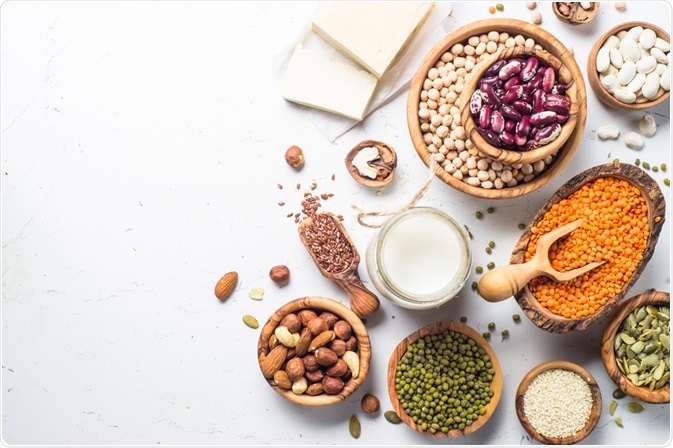High protein diets are becoming increasingly popular in maintaining a healthy lifestyle. There are many natural sources of protein for those who do not wish to take supplements, which can suit most dietary requirements.
 nadianb | Shutterstock
nadianb | Shutterstock
Why is dietary protein important?
Amino acids are nitrogenous compounds which serve to build the key structural components of muscle and tissue in the body, in the form of protein. Protein is also used to synthesize hormones, haemoglobin and enzymes.
Proteins are vital nutrients that are essential for the growth and maintenance of the human body. It is recommended that adults consume approximately 0.8g of protein per kilogram in body weight per day. This increases to 1.5g per kilogram and 1.0g per kilogram for children and adolescents respectively.
Animal-based proteins
Protein from animal sources is referred to as complete protein, because they contain all the essential amino acids required by the human body. Some sources of natural animal protein are outlined below.
Meat and poultry
Despite the high levels of cholesterol and saturated fats in some meats, meat and poultry are thought to provide very high-quality protein which contains all the vital amino acids. In addition to this, research has found that the consumption of such protein during the latter stages of pregnancy is linked to healthy body weight in the new-born infants.
Whey
Whey is the liquid part of milk that is obtained after curd removal and coagulation in the manufacturing process of cheese. Whey proteins are separated from this resulting mixture. Considered to be high in essential and branched amino acids, the bioactivity of this protein is also responsible for several health benefits including the supply of a plethora of minerals and vitamins.
Fish and seafood
Fish and seafood are highly regarded by some because of the abundance of high-quality protein they provide. This particular protein source has assisted in the alleviation of food crises in several developing countries and its consumption has grown over recent years. Eating fish and seafood is linked to a variety of other health benefits which is attributed to the presence of n-3 polyunsaturated fatty acids.
Plant-based proteins
Plant-based proteins are those found in vegetables. These are typically incomplete as they lack one or two vital amino acids. Those individuals who gain their protein from plant-based sources only are advised to regularly choose from a variety of sources, some of which are mentioned below.
Soy
Soy is a most commonly consumed vegetable protein and is extremely popular among those who are vegetarian or lactose intolerant. Soybeans contain a high concentration of branched-chain amino acids and due to this they provide complete proteins. Reported health benefits of soybean consumption include elevated high-density lipoprotein cholesterol and a reduction in blood pressure.
Nuts
Peanuts and tree nuts such as walnuts, almonds and hazelnuts are considered to be a nutritious source of high-quality vegetable protein. As well as containing fiber and minerals, the regular moderate consumption of nuts is linked to a reduction in the occurrence of coronary heart disease, diabetes and gallstones.
Legumes
Research has shown that diets containing legumes (beans) are linked to a lower incidence of high blood pressure, type two diabetes and strokes. Despite their promoted health benefits only about 8% of adults in America consume legumes every day. The amount of protein consumed as part of a regular diet can be increased by including foods such as chickpeas and lentils either by themselves or by incorporating them into existing dishes.
Are high-protein diets safe?
In recent years, many individuals, particularly athletes and serious exercisers, have opted for high-protein diets. This is characterized by the consumption of more than the recommended daily amount of protein per day.
The perceived benefits of following high protein diets include increased muscle growth and repair. However, some researchers suggest that following these diets and overuse of protein shakes and supplements can cause health disorders.
One study investigating the impact of high-protein diets (varying between low, medium and high), found that those on the high-protein diet showed an increase in urinary calcium. This resulted in increased bone resorption (removal or loss of bone), which can eventually lead to a decrease in bone mass and increase the risk of osteoporosis.
Other negative effects of a high protein diet include an excessive metabolic load on the kidneys and liver, and an increased risk of coronary heart disease if there is a corresponding increase in the intake of cholesterol and saturated fat. Cancer risk may also go up.
In summary, a healthy protein intake is essential for many bodily functions and there are a variety of complete and incomplete natural protein sources that can be integrated into any existing dietary requirements.
Further Reading
Last Updated: Jan 15, 2019